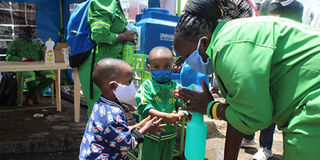Better customise coronavirus solutions

Children in Kibra, Nairobi County, are taught how to keep coronavirus at bay on April 7, 2020. PHOTO | EVANS HABIL | NATION MEDIA GROUP
What you need to know:
- Distributing free face masks can enhance social distancing, particularly in densely populated areas. Communities can be mobilised to make their own masks from local fabrics.
- While the government has begun to provide free hand sanitisers to the public, supply to informal settlements must be expedited and also increased.
When the first case of the novel coronavirus was reported in Wuhan, China, nobody predicted its globally disruptive nature.
But in just four months, Covid-19 has paralysed business, government, academia and, of course, health systems.
The world has truly changed with messages like the following inundating the airwaves and social media: stay at home; work from home; wash your hands with running water and soap; sanitise often; avoid public gatherings; observe social distancing; follow the guidelines by health professionals, and obey the directives by the government.
We are accustomed to daily updates that, besides the tally of gloom, also give stringent precautionary measures in a bid to curb the coronavirus.
But the guidelines seem to be designed for the elite. As one working in some of the remotest parts of the country and also informal urban settlements, I believe that we need a paradigm shift in how we craft our strategies.
First, we must develop transmission prevention measures that are customised to each situation and population.
The government estimates that 10 million Kenyans live in slum areas, without access to basic amenities.
POVERTY
Many informal settlements, like Kibera and Mathare in Nairobi, only receive running water three times a week for a few hours, and without proper storage containers. Residents find it impossible to regularly wash their hands with soap.
Informal settlements are overcrowded, making rubbish of the social distancing mantra. Houses are hardly a metre apart and, often, a single room houses at least five persons per night.
Further, the use of hand sanitisers, besides their being too expensive (at least Sh350, compared to a daily wage of Sh300-500 in Nairobi) for the residents, are often unavailable.
Most of these people are casual labourers who live from hand to mouth. With cessation of business, closure of schools and downsizing of companies, the struggle to get the daily wage has become even worse.
Meanwhile, in the arid and semi-arid areas, the fear of Covid-19 is palpable. Despite there being no reported cases yet, it’s just a matter of time.
Regular water supply is a pipe dream, with residents walking for over 10 kilometres to the nearest source. Adults share tiny rooms with their children.
DIG BOREHOLES
Airborne, waterborne and other infectious disease pandemics can be burdensome in large, densely populated settings.
But living in slums or remote areas should not confine anyone to the ravages of Covid-19. It is high time we seriously explored workable solutions.
In the urban slums, those involved in water purification and storage can assist with the infrastructure while the city county does daily supplies rather than thrice a week.
In remote areas, boreholes or pans near homes can facilitate quick access and abundance of water.
Distributing free face masks can enhance social distancing, particularly in densely populated areas. Communities can be mobilised to make their own masks from local fabrics.
While the government has begun to provide free hand sanitisers to the public, supply to informal settlements must be expedited and also increased.
Finally, bring in the military; then-US President Barack Obama did it to fight Ebola in West Africa. That would greatly aid in the containment of the virus and kick it out of Kenya.
Ms Matoke-Muhia, a research scientist at Kemri, is a 2020 New Voices Fellow at The Aspen Institute. [email protected].




